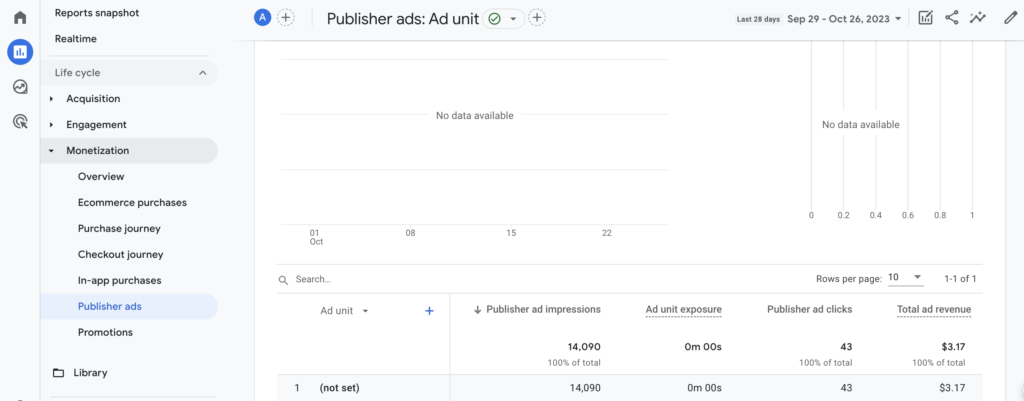Google Analytics versus Google Search Console for SEO, which one is better? In the world of digital marketing and Search Engine Optimisation, data is key. Two powerful tools at your disposal for understanding and improving your website’s performance in search results are Google Analytics and Google Search Console.
While both serve different purposes, they are complementary and can provide valuable insights into your website’s SEO efforts. In this article, I will explore the distinctions between Google Analytics and Google Search Console, and how to use them effectively to enhance your SEO strategy.
How to use Google Analytics for SEO and Keyword Research
Google Analytics is a robust web analytics platform that primarily focuses on user behaviour. It helps you understand how visitors interact with your website, where they come from, and what they do once they’re on your site. Do you think this is not very SEO related and not what you were looking for? Keep on reading to understand how to apply this to your Search Engine Optimisation efforts.
Best Reports in Google Analytics for SEO
1. Reports to Monitor Website Traffic:
Google Analytics gives you detailed information about your website’s traffic sources, including organic search, referral, direct, and social traffic. Pay attention to the organic search category, as this shows you how users find your site through search engines.
Pages and Screens Report:
This is my go-to report to measure traffic and the one that I look at to measure page views across my websites. Both mine and my clients’. The Engagement – Pages report in GA4 provides insights into the performance of specific pages on your website or app. It offers metrics such as Page Views, Unique Page Views, Engaged Sessions, Engaged Users, and Average Engaged Time.
To access the Engagement, in the left-hand navigation panel, click on “Engagement” under the “Reports” section.
Realtime Report:
This report provides live data on your website’s current traffic, showing the number of active users, their locations, and the pages they are visiting in real-time.
Acquisition Report:
Within the Acquisition report, you can explore various traffic sources, including organic search, paid search, direct traffic, and more. This report helps you understand where your website traffic is coming from.
What is the difference between the User Acquisition report and the Traffic Acquisition report? The User Acquisition shows how new users find and engage with your website over time, and Traffic Acquisition shows the channel used for every new session, regardless of whether the user is new or not.
Channels Report:
The Channels report categorises traffic sources into different channels like Organic Search, Direct, Referral, and Social, giving you a comprehensive view of how users find your website.
2. Reports to Analyse Keywords:
Google Analytics provides insights into the keywords that bring organic traffic to your site. This information is essential for optimising your content strategy and ensuring that you’re targeting relevant keywords in your SEO efforts.
GA4 doesn’t provide keyword-level data for organic search queries like its predecessor. However, you can get a limited view of the keywords that are driving traffic by using the “Search terms” report within the “Events” section. Keep in mind that GA4 primarily focuses on user privacy, which means keyword data is not as detailed as in the past.
- Evaluate User Engagement:
Track metrics like bounce rate, average session duration, and pages per session to gauge user engagement. A lower bounce rate and longer session durations indicate that your content is engaging and meeting user needs, which can positively impact your SEO.
Engagement Report: The Engagement report provides insights into user behaviour, including metrics like average engagement time, engagement rate, and engagement events.
- Implement Goals:
Define specific goals in Google Analytics, such as reaching a particular page, spending a certain amount of time on your site, or completing a form. Goals help you measure the success of your SEO strategy.
A little tip here: Some Goals need you to toggle on the Enhanced measurement. If you don’t do that you will create goals but you will not see them in the list of goals (and it won’t trigger any error, so keep that in mind).

Conversions Report: The Conversions report allows you to create and track specific goals. You can set up different types of goals, such as destination goals, event goals, and more, to measure conversions on your website.
Measure Your Ad Revenue. Go to Reports – Monetization – Publisher Ad Reports. You will gain insights on Ad Unit Exposure, Publisher ad clicks, Publisher ad impressions and Total Ad Revenue.

How to use Google Search Console for SEO and Keyword Research
Google Search Console, formerly known as Google Webmaster Tools, is a tool designed specifically for webmasters and SEO professionals. It focuses on the technical aspects of SEO and provides valuable insights into how Google perceives your website.
I have done quite a few articles on Google Search Console for more specific SEO tasks, but today I will focus on the basic insights. You can check other Google Search Console articles below:
Common Indexing issues in Google Search Console and how to solve them.
How long does it take for Google Search Console to index?
How To Get A Page Indexed Faster With The Inspection Tool In Google Search Console
How to use Google Search Console for Keyword Research
Best Tools in Google Search Console for SEO
Submit Sitemaps:
Start by submitting your website’s sitemap to Google Search Console. This helps Google index your pages more effectively, ensuring they appear in search results.
To produce a sitemap you can instal the Yoast Plugin in your website or any other SEO plugin that you prefer.
Monitor Search Queries:
The “Performance” section in Search Console offers detailed information about the keywords that drive impressions and clicks to your website. Use this data to identify high-performing keywords and uncover opportunities for optimization.
Identify Indexing Issues:
Search Console highlights indexing problems, such as crawl errors, mobile usability issues, and security concerns. Resolve these issues promptly to maintain a healthy website presence in search results. You will find this information in the Pages section.
URL Inspection Tool:
Check if a particular page is indexed (eligible to appear in the Search results) or not by dropping it to the URL Inspection Tool bar at the top. This is particularly useful when you create a new page or when you update some content (as it can take long for Google to naturally re-index it).
Track Click-Through Rates (CTR):
The CTR data in Search Console shows you the percentage of users who click on your site’s links in search results. You can use this information to evaluate the effectiveness of your meta titles and descriptions and make adjustments to increase click-through rates. Go to Performance and look at the Average CTR tab.
Monitor Backlinks:
Backlinks is my least favourite part in SEO. They are hard! But they are necessary, my human friends. The “Links” section in Search Console provides insights into websites linking to yours. Monitor the quality and quantity of backlinks, and disavow any spammy or harmful links to protect your site’s reputation. The Links Report, in the left hand menu will show you this information.
How to use Google Analytics and Google Search Console combined for better SEO rankings
While Google Analytics and Google Search Console serve different purposes, they can be integrated to provide a comprehensive view of your website’s performance. Here’s how to combine the insights from both tools to maximise your SEO efforts:
Keyword Insights: Use Google Search Console to identify high-potential keywords that drive traffic to your site and then analyse user behaviour around those keywords in Google Analytics. This will help you understand how users interact with your content and whether it aligns with their expectations.
Content Optimisation: Based on data from both tools, optimise your website’s content to better serve user intent and improve engagement. Update existing content to make it more relevant to users´ queries or create new content where you see opportunities.
Here is a set of tactics on how to actually implement the keywords from Google Search console to update or create new content.
Technical Improvements: Google Search Console provides invaluable insights into technical issues that may affect your SEO. Regularly monitor and resolve these issues to ensure your site is search-engine-friendly. Technical improvements can boost your rankings more than you would think. You can use tools like https://pagespeed.web.dev/ to check your speed performance.
Performance Tracking: Track the impact of your SEO efforts over time by monitoring changes in organic traffic, keyword rankings, click-through rates, and conversion rates using both tools. Check what pages receive more traffic in the Pages and Screens report and check what pages are shown most often in Google by looking at the Performance section in GSC.
SEO Indexing Daily Routine for a New Website:
- Check the Pages report to monitor how many of your pages are being indexed and find out about potential indexing issues.
- Fix indexing issues (canonicals, etc), if any.
- Submit for indexing those pages which are ready but aren’t indexed yet.
- Check the Performance report to find most successful queries.
- Check Google Analytics – Pages and Screens to find most successful pages.
- Create new content or update existing content based on keywords.
- Repeat the process.
So going back to my initial question – Google Analytics versus Google Search Console for SEO, which one is better? Google Analytics and Google Search Console are both indispensable tools for SEO professionals and website owners. While they serve different purposes, their combined insights offer a comprehensive view of your website’s performance.
By understanding user behaviour, optimising content, and addressing technical issues, you can effectively enhance your website’s visibility in search results and drive more organic traffic. To purr-fect your SEO game, don’t just rely on one; use Google Analytics and Google Search Console as your purr-fect purr-tners in this mouse hunt. 🐾
Stay purr-sistent, my savvy marketers, and catch you in the next paw-some post!
Moxie

